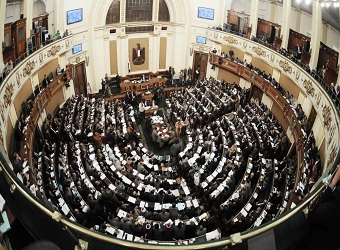The head of the Egyptian parliament’s culture, media and antiquities committee, Osama Heikal, revealed Saturday that the committee will begin Sunday holding a series of hearing sessions on two government-drafted media laws: one to create three media regulatory bodies, and the other seeking to supervise the media as a whole, including the press, radio and television and electronic news websites.
“This comes upon the recommendation of the State Council, which advised that the creation of three regulatory bodies come in a separate law, and ahead of discussing and passing a unified law on the media,” Heikal told reporters Saturday.
Heikal said that articles 211, 212 and 213 of Egypt’s 2014 Constitution stipulate the creation of three media regulatory bodies – the Higher Council for Media Regulation (HCMR), the National Press Organisation (NPO) and the National Media Organisation (NMO).
“While the second and third bodies will be in charge of regulating a certain media sector, the first will be mandated with overseeing the performance of all media outlets in general,” Heikal said.
Mostafa Bakry, an independent MP and a high-profile journalist, told reporters Saturday that “each regulatory body will govern a certain media sector, and the National Press Organisation (NPO) is the most important.”
“This NPO will replace the current Higher Press Council, taking charge of supervising the state-owned or national press. The NPO will be responsible for selecting board chairmen of national press organisations and the editors of their affiliated publications. Each board will comprise 17 members – nine of them elected and eight named by the NPO. Boards will serve a three-year term,” Bakry said.
Ali Hassan, chief editor of the government-owned Middle East News Agency (MENA), said last week at a press seminar at Ain Shams University that “The draft law on media regulatory bodies states that the NPO should guarantee the independence of national press organisations.”
“The NPO will make sure that national newspapers and magazines act in a professional way, reflecting all points of view in a neutral manner, because they are national media outlets not private or partisan mouthpieces,” said Hassan.
Hassan also indicated that the new NPO will be mandated to name the chairs of national press organisations.
“Candidates must meet a number of conditions. They must have no less than 20 years professional experience in press, administrative and financial circles, have no criminal record, no shares or stocks in any press organisation, no affiliation with any political party, and be in a position to fully exercise their political rights,” said Hassan.
The law also states that the NPP separates editorial staff and organisation boards.
“Editorial teams composed of 11 senior journalists will determine the publication’s editorial policy without any interference from the board,” says Hassan.
Editors-in-chief, who must have at least 15 years professional experience, will serve three-year terms that can be renewed just once.
The law also states that journalists retire at the age of 60. “It does, however, allow journalists to work until they are 65 providing they are approved by the board on an annual basis,” said Hassan.
Minister of Parliamentary Affairs Magdi Al-Agati told MPs last week that “It was originally proposed that a unified law on the media and its affiliated three regulatory bodies be drafted, but the State Council recommended that the legislation be divided into two separate laws: one on the unified media law and the other on regulatory bodies.”
Al-Agati indicated that members of the three media regulatory bodies – the Higher Council for Media Regulation, the National Press Organisation, and the National Media Organisation – will be selected ahead of the passing of the unified media law.
“The constitution stipulates that these bodies and their boards be formed ahead of the unified media law,” said Al-Agati.
In addition to boosting the performance of national press organisations and naming their chairmen and editorial staff. the NPO will be entrusted with conducting periodic reviews of the financial and administrative performance of these organisations.
“It will act like a watchdog, ensuring national press organisations generate profits, place maximum and minimum limits for wages and set the price of papers and magazines,” said Hassan.
On the other hand, the National Media Organisation (NMO), which forms another part of the media regulatory bodies, will oversee state-owned audiovisual, radio and digital media institutions in a manner that guarantees their independence, professionalism and profitability.
The NMO will primarily face the difficult task of reforming the giant Radio and Television Union.
The NMO will focus on turning the union from a huge loss-making institution into a profitable and attractive business.
As for the Higher Council for Media Regulation (HCMR), the law states that it will supervise all media outlets in Egypt.
“The HCMR will regulate all forms of media outlets, audio, visual, digital and print in coordination with NPO and NMO,” said Bakry.
The draft law states that the HCMR’s board will comprise of 13 leading media experts.
It will give priority to reviewing all media laws, including the Press Syndicate Law, which dates back to 1970.
The HCMR will also draw up a code of media ethics, respecting public morals and national security concerns, which all media organisations – public, private or partisan – will be expected to abide by.
Source: Ahram Online


